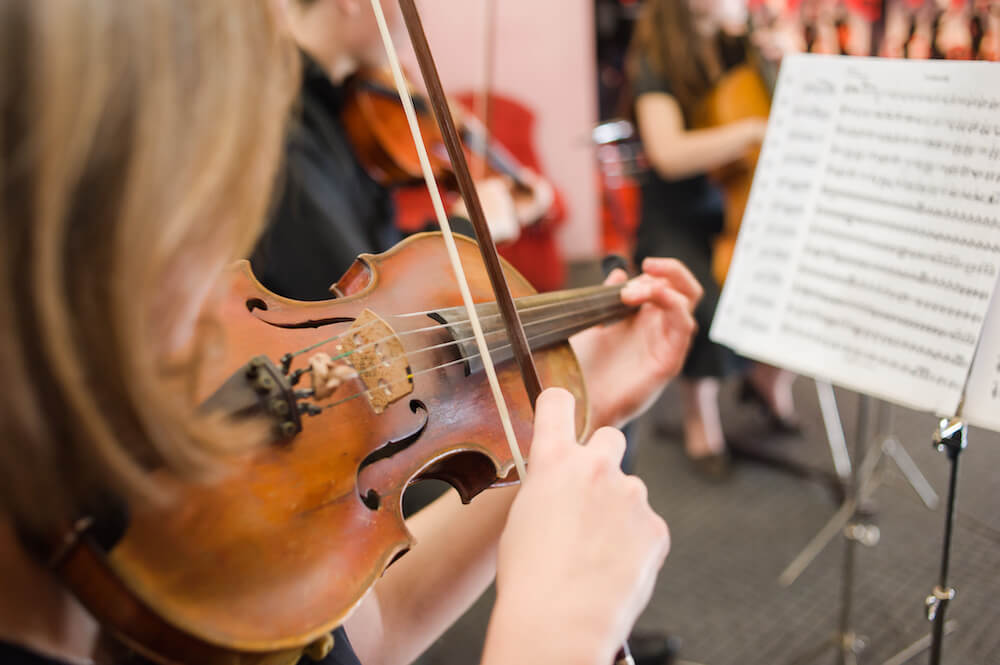Here at Command Education, a question we often get from parents whose students take music lessons is whether playing an instrument will boost their chances of admissions to a top university. Students who commit to playing music (practicing daily, playing in school orchestra/band, etc.) can easily demonstrate to colleges that they are disciplined, a quality all colleges look for in their applicants. However, students who possess extraordinary musical abilities well beyond those of their peers may opt to use music as their admissions “hook” — a unique skill or project a student has worked hard to develop during their high school career.
No matter which hook a student uses to apply to colleges — whether as a musician, a student-athlete, or a debater — it is incredibly important that they demonstrate incredible talent and commitment to their craft. Due to the competitive nature of Ivy League admissions, students who use music as their hook must clear an incredibly high bar. Students who matriculate into Ivy League schools as musicians are often also accepted to top music schools and dual-degree music programs. Only at this level of skill and commitment will a musician be considered unique and talented enough to gain admission to top schools. Since the main crux of any admissions office’s work is to evaluate whether a student will both bring unique skills to the school and enhance the diversity of the incoming class, casually playing music will not suffice to create a music hook — many other applicants will have played music as an extracurricular activity by the time they apply to college.
To develop a music hook, we advise our students to demonstrate a track record of musical excellence through a variety of musical commitments, experiences, and accomplishments. Here are a few activities our students have completed in the past, either individually or in tandem with other activities on this list, that have helped them build strong applications and successfully gain admissions to Ivy League institutions using music as their hook.
1. Attending a pre-collegiate, comprehensive music program
There are several high-caliber, comprehensive music programs for elementary, middle, and high school students offered by reputable music institutions, such as the Juilliard School’s Pre-College Program, Colburn Music Academy, and New England Conservatory Prep. These programs not only offer music lessons with world-renowned teachers, but also orchestras and chamber music ensembles, music theory and courses only found at conservatories, as well as performance and networking opportunities.
Attending programs such as these demonstrates to colleges that the student is absolutely committed to studying all aspects of music at a high level, in addition to being an exceptional performer for their age. These programs are also high on Ivy League admissions committees’ radars. For example, Juilliard Pre-College is particularly well-known for being a “feeder” program, hosting panel discussions featuring admissions officers from every Ivy League school and other top schools in the U.S..
2. Participating in a selective ensemble
Many top high school musicians are often also participants of high-caliber youth orchestras. In the U.S., the most well-known youth orchestra is undoubtedly the National Youth Orchestra of the USA, an annual summer program held by Carnegie Hall. There are also many regional youth orchestras held in high regard, including the Chicago Youth Symphony Orchestra, the New York Youth Symphony, and the Boston Youth Symphony Orchestra. These ensembles are often well-funded and take students on national and international tours, creating unique experiences which students can learn from, reflect on, and perhaps even write about in college application essays or supplements. Most of these programs are funded by reputable philanthropic organizations and large private donors and are free for students who attend, making admission to these programs very competitive.
3. Winning reputable music competitions
Some students have great luck taking their music and competing head-to-head against other musicians their age, both in the U.S. and abroad. These competitions can range from regional competitions judged by big names in the field, to international competitions that practically every musician has heard of, such as the International Tchaikovsky Competition and the Cliburn International Junior Competition. Even if a student doesn’t use music as their application hook, winning such a competition would make for a great addition to the awards section of their college applications, and they can write about preparing for and performing at such a competition in their application essays.
In addition, many music competitions also offer scholarships. Several prestigious competitions, including the YoungArts competition, the Davidson Institute Fellows Scholarship, and GTMF Donald Runnicles Musical Arts Scholarship Competition, all carry a maximum award prize of $10,000 or more.
For seniors interested in the U.S. Presidential Scholars Program, being selected as a “Finalist” in the YoungArts competition (essentially winning first prize) opens the path for a nomination as a Presidential Scholar in the Arts. Students that are nominated as candidates to the program in January of their senior year should immediately update their applications with their candidacy status. While the winners of the Presidential Scholars Program are announced in May, which is too late for any senior to use in their college applications, it may be tremendously useful for getting off a waitlist or for building a strong transfer application.
These are just some of the ways students have been able to demonstrate their level of musicianship to colleges and set themselves apart from other applicants. While a successful hook will boost your chances of admissions, we should emphasize that other components of your application, such as your academic grades and personal statements, must be on par with that of a competitive applicant to an Ivy League school. Because of the high level of skill exhibited by students with a music hook, many students should also audition for music schools and consider dual-degree programs.


